As we continue to witness the genocide in Palestine, words can feel impossible to write; how many more ways are there to articulate the ongoing horrors? But we must remember that we are part of a larger, international movement for Palestinian liberation, with so many organisations working in so many different ways in solidarity with Palestine, and we must continue to speak up. In this blog post, we share words and updates from participants of the LWA’s Palestine Solidarity Twinning Project, a collaboration with the Union of Agricultural Work Committees in Palestine.
Twenty-one months into the genocide, and decades into the violent Israeli occupation of Palestinian lands, the situation in Gaza and the West Bank remains to be one of relentless terror, loss, and devastation. In Gaza, over 55,000 people have been killed and over 127,000 people wounded by Israeli forces since the siege began in October 2023.
The blockade of life-saving aid into Gaza means families are dying from hunger and malnutrition. Farmland has been poisoned, kitchen gardens have been bombed, and basic infrastructure like wells and greenhouses have been razed to the ground. In the West Bank settler violence has intensified, farmers are unable to access their lands, livestock have been murdered and fields burned.
As the horror unfolds before our eyes, here in the UK and the rest of the world it’s easy to fall into a sense of helplessness, grappling with the seemingly impossible question: ‘What can we do to alleviate the pain and suffering of the people of Palestine?’.
The LWA and our members have been vocal in our support for Palestine, we’ve held sessions at the Oxford Real Farming Conference, hosted fundraiser film screenings, attended demonstrations, signed and shared the Farmers Against Forced Starvation open letter, intervened in UN spaces, and attended events to speak out about Gaza. We’ve kept Palestine in our hearts, in our minds and in our actions, and we’ve refused to lose hope.
At the end of 2024 the LWA kickstarted a new initiative with the Union of Agricultural Work Committees / UAWC (the La Via Campesina member organisation in Palestine), to build networks of grassroots solidarity with LWA members here in the UK and land-based projects, farms and cooperatives in the West Bank. Now, with the pilot phase of the Palestine Solidarity Twinning Project (PSTP) complete, we’re pleased to say that there are 10 successfully twinned projects taking part in the initiative.
Our members have been in regular communication with their twinned projects in the West Bank, listening to their stories and experiences of farming under occupation, raising awareness about the situation in the West Bank and the ongoing genocide in Gaza, gathering funds to support Palestinian land-based businesses and livelihoods, and platforming the Palestinian voices that are systematically silenced by mainstream media.
UAWC have been repeating their calls for international volunteers to travel to the West Bank to help defend farms and lands from illegal Israeli occupations. You can find out more about their campaign here. But for those who cannot afford to leave their land, families and duties of care here in the UK, the twinning project has allowed networks of solidarity to emerge virtually. The benefits of these human connections – in both directions – have been tangible, if hard to quantify.
The PSTP initiative aims to match farms and projects with similar production systems or business models, to facilitate knowledge-sharing and help find common ground in the daily rhythms of their respective land-based work. In this blog post, we share some of the special connections that have been made so far in the Palestine Solidarity Twinning Project, in a small, but meaningful attempt to extend support and solidarity to Palestinian farmers, land workers and peasant communities in these dark times.
Al Mughayyair Co-operative Farm and Fresh and Green Vegetables
LWA Members ‘Fresh and Green’, who are based in Devon, are twinned with Al Mughayyair farm; a co-operative farm in the north of Ramallah, comprising eight women and seven men. Al Mughayyair grows vegetables, grapes, tomatoes, and other crops in polytunnels and open field areas, and they source their seeds from the UAWC local seed bank.
Access to land has been very problematic since October 7th. Land belonging to the village and the people who live there has been annexed, and in April 2024 the co-operative’s polytunnels were attacked and burned by Israeli settlers. Since then there have been repeated ongoing attacks. Precious water supplies, deliberately interrupted. Livestock killed, or stolen. Farmers harassed in their fields, or being prevented from reaching their lands to work. The list of injustices goes on.
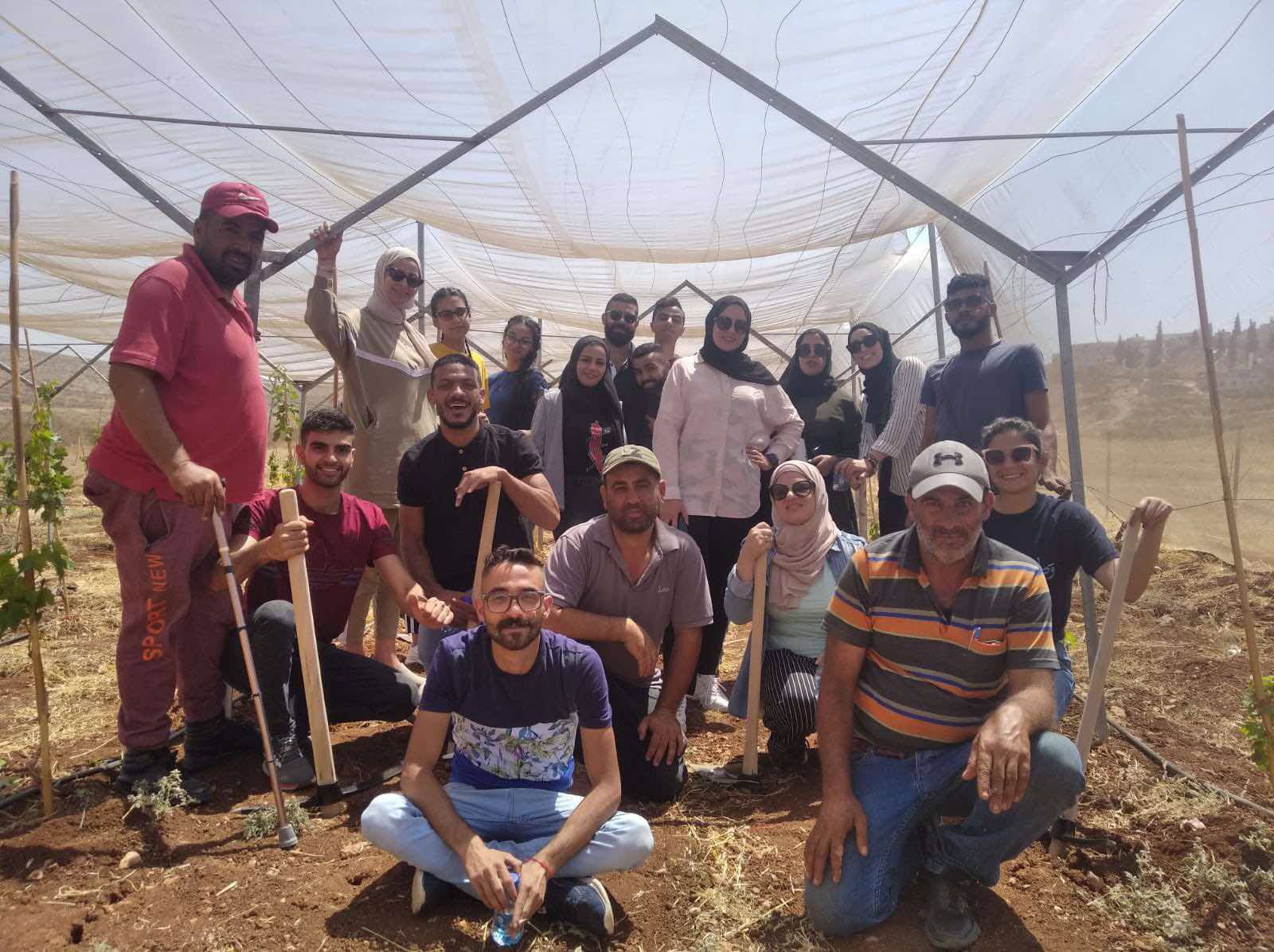
Growers at Al Mughayyair
Here is a message from Ghassan, a grower at Al Mughayyir farm (originally sent to Fresh and Green in a WhatsApp exchange):
“My friends – allow me to call you “my friends”, because that is truly what you are.
You are providing a great service to us and to humanity. Our struggle is long and has extended over many years, and creating meaningful change takes time, effort, and patience.
That’s why both you and we need to remain patient, to continue with our lives, while also dedicating part of our time to working toward positive change in our societies.
Some of the largest demonstrations in the world have taken place in your country, and that is a reflection of your impact and your ability to make your voices heard. In the medium term, we will begin to see the results of these efforts.
We deeply appreciate all that you are doing, and we know that you are facing a deeply entrenched lobby among politicians, the wealthy, and those who control media and politics.
Creating change takes time — but it will come, as long as we stay on the right path.
Our goal is peace, freedom, justice, equal opportunity, and a life of dignity and liberty for all peoples — and for cooperation to prevail over conflict.”
Here are some reflections from Ruth at Fresh and Green:
“Our desire as a farm, and as LWA members to get involved in the twinning project, came out of the deep frustration that I’m sure that many of us have felt; at our inability to do very much that connected to the actual landworking people experiencing the awful events on the ground in Palestine. We wanted to express via both words and actions some form of solidarity with these farmers and growers.”
Sometimes we just chat about farming and growing – updating each other on the progress of our cucumbers, what crops we’ve been planting, weeding and harvesting, progress of grape vines or apple trees, plus sharing news of friends and family on our farms – all the usual everyday things. Which is what makes these personal connections so special.”
And yes we also discuss and share news of the terrible conditions that the cooperative members are living under, the settler harassment, the awful unprovoked violence done, and the terrible destruction wrought at the farm when polytunnels were deliberately damaged by occupation vandals.”
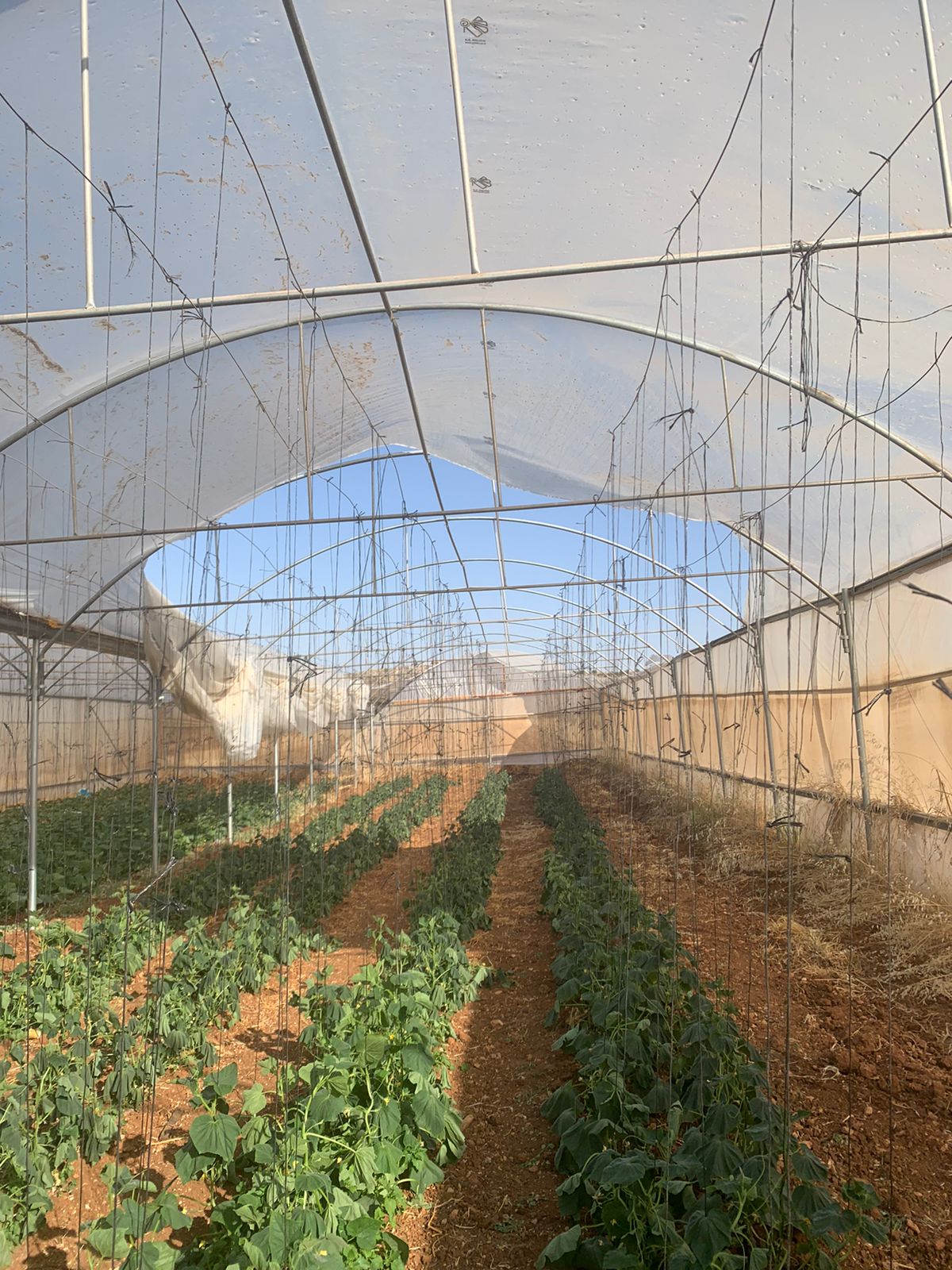
Al Mughayyair polytunnels damaged by settler attacks in April 2024
We’ve also exchanged some details about seasonal native plants that we each harvest for food – talking about the wild plants that are available here in Devon in the springtime..
Finding out for instance about Akoub, a thorny wild plant with a deep cultural culinary and medicinal heritage a little like a furry artichoke. It grows wild in the lands around the village – but again the harvesting of it in season is restricted by occupation activities.
Our conversations have ranged across geology, local foods, our respective union work, the dangers of genetic modification, and much more besides – perhaps on occasion this provides a psychological relief from the heinous activities of the occupation.
None of this of course negates the very real struggles that many of us face as farmers and growers in the UK, but to stand alongside, albeit ‘virtually’ those who are suffering so much oppression at the hands of occupying forces, whilst trying to provide food for their communities is truly humbling.
Ongoing we aim to deepen this connection via various methods such as a live link with women from Al Mughayyir at this year’s landworking women and diverse genders event here at our farm in August.And we truly hope that one day that peace and justice will have been restored to the extent that in-person farm and social visits could be made in either direction.”
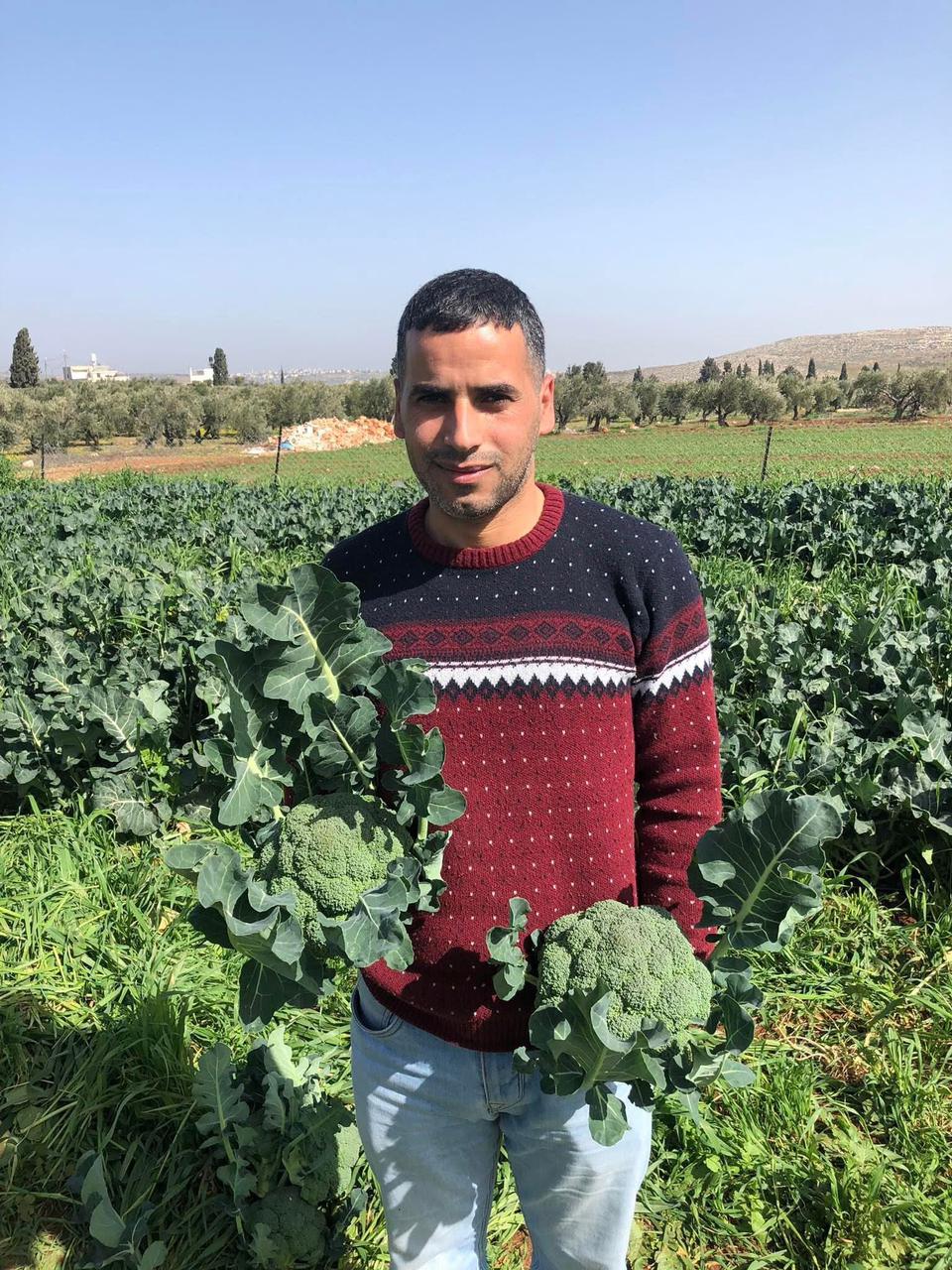
One of the growers at Al Mughayyair
Palestine Local Seed Bank and Exeter Seed Bank
LWA Members at the Exeter Seed Bank are twinned with the Palestine Local Seed Bank, which was established in 2010 as the first national seed bank in Palestine. Its main goal is to preserve local seeds and help farmers grow crops in environmentally friendly ways by providing high-quality seeds that are suitable for their land, and to protect local agricultural biodiversity and seed sovereignty across the Palestinian territories amidst the occupation. So far more than 76 local varieties belonging to 14 plant families have been preserved.
In a big achievement in 2024, the Local Seed Bank saved seeds from 24 Palestinian plants and sent them to the Svalbard Global Seed Vault in Norway. In a statement UAWC said: “This achievement comes as part of the UAWC’s strategy to protect Palestinian crops from the threat of confiscation and deliberate vandalism that threatens the Palestinian agricultural heritage, amid the genocidal war waged by the Israeli occupation on the Palestinian people and their continuous attempts to abolish their existence and control their resources. This step aims to preserve Palestinian crops for future generations, considering the escalation of Israeli encroachments targeting land and agricultural infrastructure and imposing severe restrictions on farmers, in addition to the effects of climate change.”
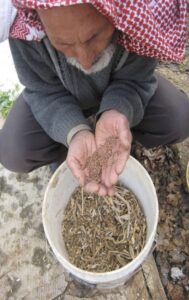

Making seed pots as part of the 'craftivism' workshop to raise funds for the Palestine Local Seed Bank
Here are some reflections from Johanna at the Exeter Seed Bank:
“We have met online with staff of the Palestine Local Seed Bank and shared our activities. They are a seed saving organisation at a professional standard, unlike ours which is community-based and without formal facilities.
We’ve been hosting ‘craftivisim’ activities, which create a space for people to use their hands making seedling pots and have conversations about our twinning project and what is going on in Palestine. We have an ongoing selection of pots made by people to give away for a donation and all proceeds go to Palestine Local Seed Bank.
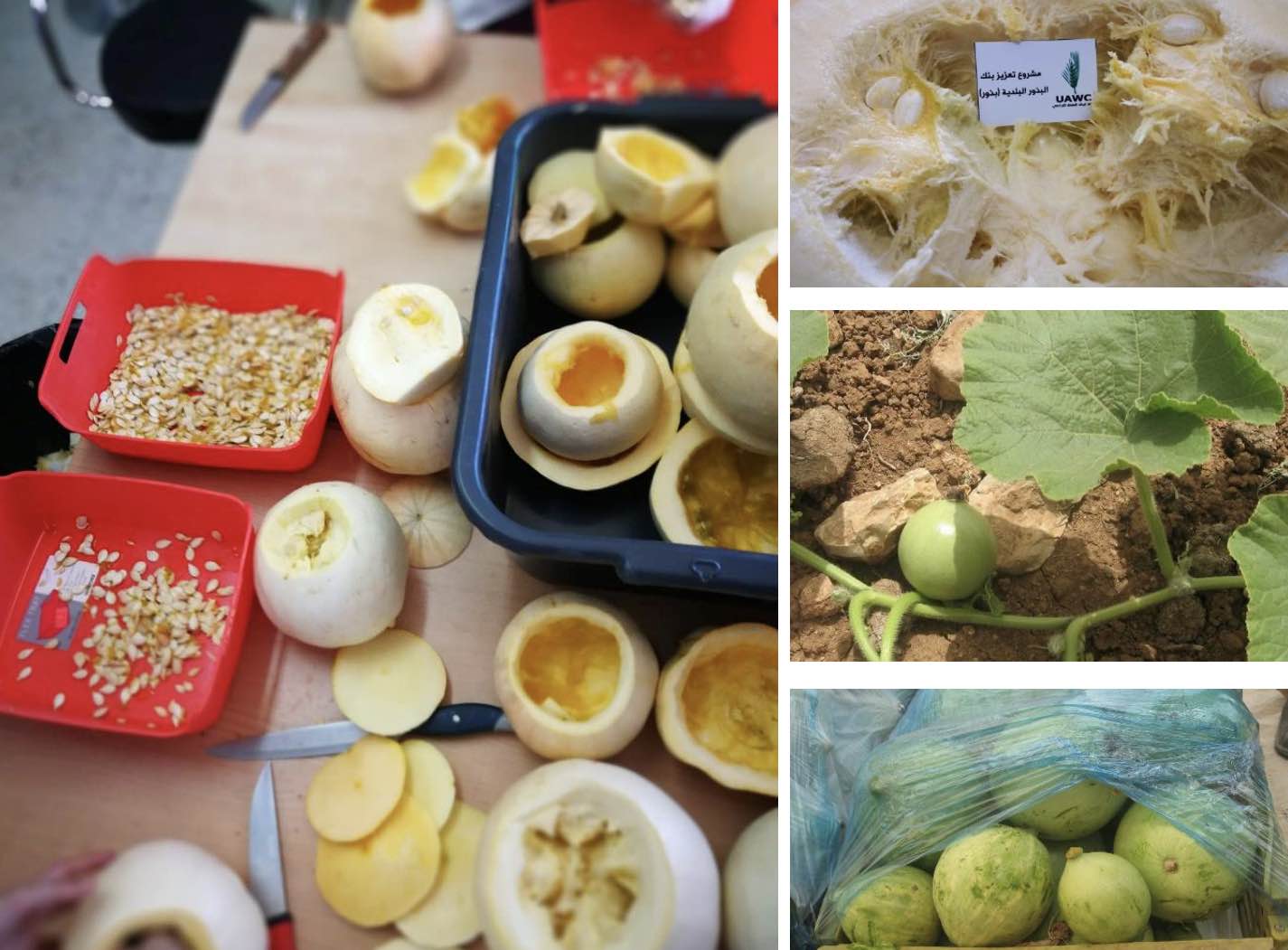
Saving pumpkin seeds
They [the Palestine Local Seed Bank] are interested in the arts side of our work in engaging with local communities, but due to the conditions that they are operating under and the importance of their work to farmers, they simply don’t have that capacity or headspace for this type of creative engagement.
Our aim is to get other community seed banks involved in the twinning and to create their awareness raising activities.”
So far the PSTP has helped to build these kinds of farmer-farmer connections, which have opened avenues for fundraising activities, events, and knowledge-exchange. Unfortunately, due to the worsening situation in Palestine, UAWC have had to put a temporary pause on supporting other Palestinian farms to join the initiative, as they have to dedicate their time and energy to more urgent areas of their work.
In the meantime we will continue to support our comrades at UAWC by amplifying their campaigns, announcements and calls to action. If you are interested in joining the LWA’s efforts to act in solidarity with landworkers in Palestine please email lwa-palestine-solidarity@googlegroups.com

